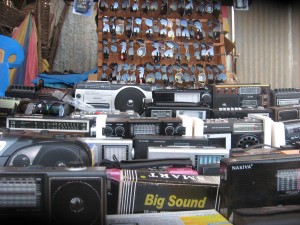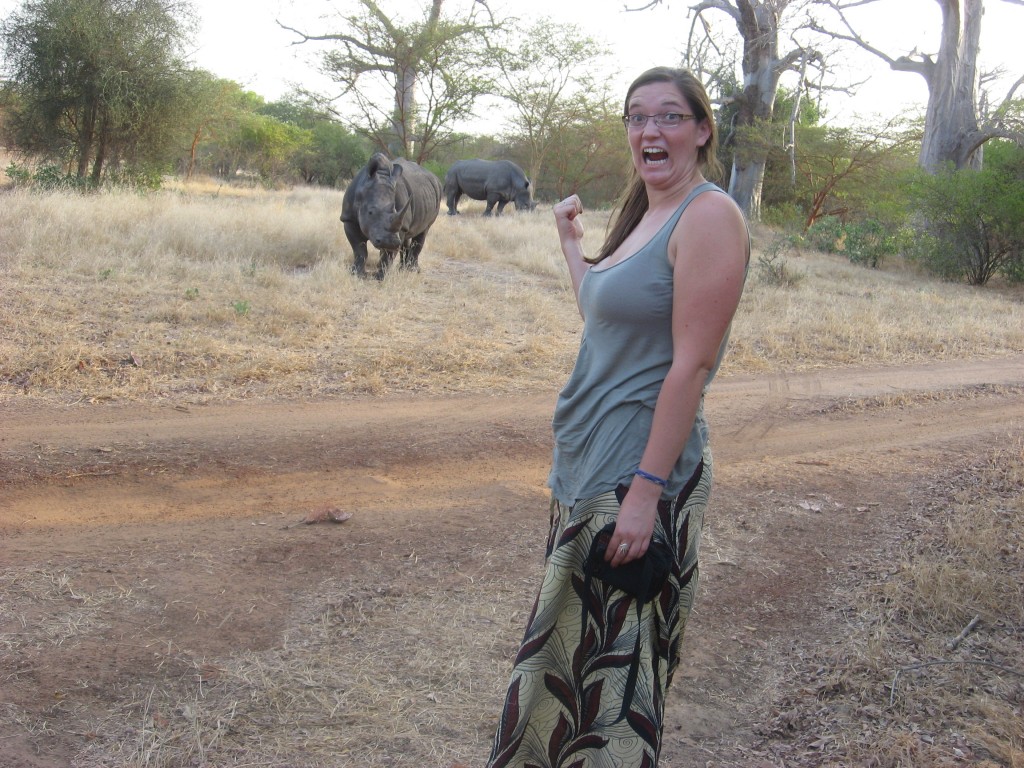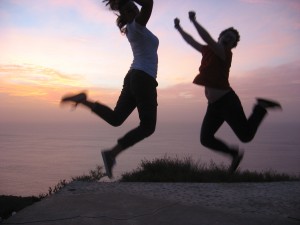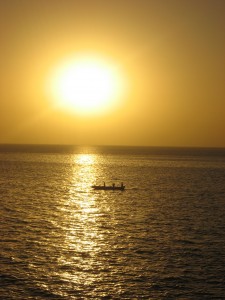It has always been my dream to be on NPR. I love the radio. I love listening to stories and here Senegalese culture is dominated by oral tradition. People call into radio stations not to complain about politics directly (that is forbidden I think) but really just to hear themselves talk. The Wolof language is rarely written down (making textingin the language especially interesting). And the Senegalese are incredibly talented in the art of conversation and talk for hours. When speaking French they rarely use the word ‘parler’ (to talk) instead they prefer ‘discuter’ (to discuss). For all of these reasons I decided to make an audio documentary of our semester here for my final project. The best part for me was when I had finished the ‘podcast’ and the other SIT students sat down with me for an hour and a half snuggled on a hotel room floor and listened to it together flaws and all.
I did not choose the most ‘academic’ subject to research. My peers astounded me with subjects like traditional medicine, homosexual women in Senegal, skin bleaching, language education, and the response to the African Renaissance Monument (highly controversial, full of propaganda, and bigger than the statue of liberty). My friends actually had to have interviews with real academic people. They wrote 40 page papers (sometimes in French). I on the other hand talked (or rather discussed) with my friends and family for hours and hours about us and our experience in Senegal. Really really hard stuff. But I am really glad that I was able to finish the audio documentary and give it away at the end of our experience.
So that was ISP. Independent Study Project. But the second part of ISP was living in an apartment with some of my favorite people and discovering even more of Dakar and to continue learning about the culture. The thing that I really got drilled into my head during this time was how helpful, welcoming, and absolutely great Senegalese people are. I would like to give you three examples.
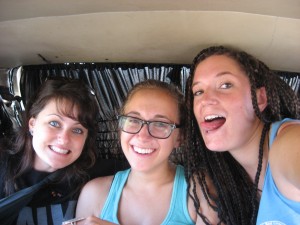 #1) I left my little purse in a Taxi. In my purse was my dead cell phone, my camera, a tiny bit of money, and a copy of my passport. In short I got it back. I left it in a Taxi that doesn’t even work in the same town as I live. [This photo was taken in the back of the famed taxi.] I had given my stuff up for good when the next day my phone calls my housemates and a guy who doesn’t really speak French is trying to communicate with me. I couldn’t even get a ‘where are you right now’ out of him. Was he in Dakar? After at least five different phone calls where he was trying to get me to call this other number (which I called and it was definitely a random street person) I finally have the idea of finding someone who can speak Wolof to speak with this guy. I ask the daughter of our landlady a beautiful woman who speaks with the guy and we decipher that he is going to give all my stuff (yes all of it) to the leader of the Taxi drivers from Thies and eventually it will be in a Taxi on its way from Thies to Dakar TODAY! Rose (the daughter of the landlady) gave him her number and she went with me to meet this random taxi driver who had my stuff. Once I had it all, the original taxi man called and told me to look in my purse make sure everything was there, even my equivalent of 5$. It was all there. Alxamdoulilah!
#1) I left my little purse in a Taxi. In my purse was my dead cell phone, my camera, a tiny bit of money, and a copy of my passport. In short I got it back. I left it in a Taxi that doesn’t even work in the same town as I live. [This photo was taken in the back of the famed taxi.] I had given my stuff up for good when the next day my phone calls my housemates and a guy who doesn’t really speak French is trying to communicate with me. I couldn’t even get a ‘where are you right now’ out of him. Was he in Dakar? After at least five different phone calls where he was trying to get me to call this other number (which I called and it was definitely a random street person) I finally have the idea of finding someone who can speak Wolof to speak with this guy. I ask the daughter of our landlady a beautiful woman who speaks with the guy and we decipher that he is going to give all my stuff (yes all of it) to the leader of the Taxi drivers from Thies and eventually it will be in a Taxi on its way from Thies to Dakar TODAY! Rose (the daughter of the landlady) gave him her number and she went with me to meet this random taxi driver who had my stuff. Once I had it all, the original taxi man called and told me to look in my purse make sure everything was there, even my equivalent of 5$. It was all there. Alxamdoulilah!
#2) A purse that I had bought in Thies broke. The strap disconnected. I was walking by one of the five tailors on my street and I just stopped in and asked if he would mind fixing it. He did, then and there, no questions asked. I have since given him a lot of other work which I am stoked to give away as presents to you lucky few 😉
#3) I was walking to a lunch at our favorite restaurant when my sandal broke (a sandal that was given to me as a gift). I was limping along the road all the way to the restaurant. Eventually I just had to take the shoe off (that was a dangerous move). When I got to the restaurant the waitress noticed, gave me her shoes to wear for the time being and said I could go to a cordonee to go get my sandal fixed, there was a little one close by. Sounded like a good plan to me. So after lunch I asked her about the cordonee and when I could give her back her shoes. She said she would walk me there and when we arrived the sandal was already fixed! She had taken it there during lunch.
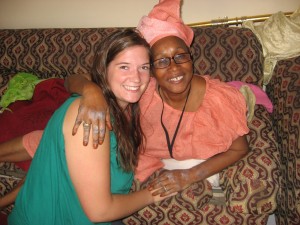
The Senegalese generosity, hospitality, or ‘Teranga’ as it is called was also one of the reasons that I had a bit of a hard time leaving. All of a sudden when I was ‘on my own’ so many people came out of the woodwork to help me out when I needed it. All of a sudden I felt comfortable in Senegal. I had a great network of friends who I knew would take care of me. In my interviews for my audio documentary I learned several things. First of all the Senegalese notice that we Americans do not know how to share like they do. We cook for ourselves, we don’t always offer whatever we are eating or drinking, sometimes we question (well I questioned) when someone asks for something instead of just giving it. Second the one message that they wanted to leave us with was keep in touch, “Jamais oubliez quel qu’on qui fait quelque chose bon pour toi, jamais oubliez.”. Never forget someone who has done something nice for you. I know for me I will never be able to forget. Like this woman who was the host mom of another student. I stayed with her and her family after the program ended for a few days. She invited me to this market that was a fundraiser for a bilingual school. On our walk there she grabbed my hand said ‘I’m scared of falling’ and we walked like that all the way there, through the market, and all the way back. I immediately felt comfortable and welcomed just like I was her family.
Logistics: I am not in Senegal anymore, the SIT program ended on Dec 14th. I stayed in Senegal until the 21st of December whereupon I flew to where I am now. Germany. But first: my last days I will try to document with more photos than words.
I Our program finally took us to ‘Africa’. This is a rhino. All the animals were imported.
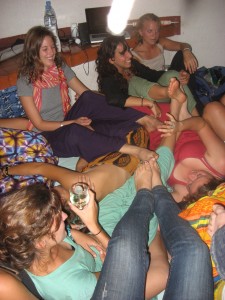 <——- This was a listening party of my Podcast
<——- This was a listening party of my Podcast
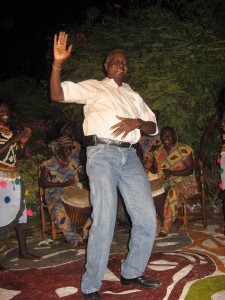 This is Souleye, our academic director, who hired drummers and dancers to play for us at our hotel after our presentations were over. Watching Souleye dance: priceless.
This is Souleye, our academic director, who hired drummers and dancers to play for us at our hotel after our presentations were over. Watching Souleye dance: priceless.
After the program was over a few other students and I spent time on the beautiful coast. We pretended to be French tourists, ate buffets at hotels, played beach volleyball with paying guests, and we sat down and crafted things out of leftover fabric scraps. When I got back to Dakar I slowly had to say good-bye to the rest of the students as they left one by one. I was given the going away present of Mauritanian henna (usually reserved just for marriages) by the Senegalese family I mentioned above. I went to the light house to watch the sunset. Then I moved into another host family’s house and spent my last few days saying good-bye to my Senegalese family and hardest of all the friends I made. We ate ‘NiceCream’, went to our favorite bar Chez Mendy’s, and we jumped on the corniche trampolines for yet another Dakar sunset. When the time came three of my dearest friends hopped into a taxi with me. They carried all my bags and my djembe drum full of clothes into the airport for me. Then I gave them each one last hug, cried a little tear then for each of them and waited continued on to wait in airport lines and think about them.
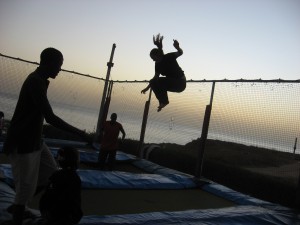
Now I am in Germany, thinking about Senegal, but also my next few weeks. Tomorrow I fly Ryanair (i have heard scary stories about the airline) to Barcelona. From Spain I am going to a small village in S France to volunteer for a family in exchange for lodging. I will be helping to build a straw bale house which brings me full circle to one of my last days in Montana where I was once again helping a friend ‘mud’ the outside of her straw bale house. Funny world we live in!

